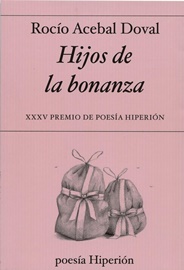Rocío Acebal Doval, Hijos de la bonanza
DOI:
https://doi.org/10.20420/Phil.Can.2022.475Keywords:
Acebal Doval, poetry, Hiperión Award, disenchantment, feminismAbstract
Rocío Acebal Doval, Hijos de la bonanza. Madrid: Ediciones Hiperión, 2020. 72 pages. ISBN: 978-84-9002-159-0.
Supporting Agencies
This review is part of a research project funded by the Ministry of Science, Innovation and Universities of the Government of Spain [Project code: PID2019-107687GB-100].
Downloads
References
ÁLVAREZ PORRO, M. 2020. “Hijos de la bonanza: desencanto generacional”, Culturamas, 08/11/2020. Disponible en: https://culturamas.es/2020/11/08/hijos-de-la-bonanza-desencanto-generacional/.
BAGUÉ QUÍLEZ, L. 2021. “Para matar el tiempo”, Babelia, El País, 08/06/2021. Disponible en: https://elpais.com/babelia/2021-06-08/para-matar-el-tiempo.html.
BAÑOS SALDAÑA, J. Á. 2022. “La dinamicidad de los textos literarios: Hacia una tipología de la transreferencialidad”, Revista Signa, 31, pp. 271-292. https://doi.org/10.5944/signa.vol31.2022.29444.
CLARK, B. 2006. Los hijos de los hijos de la ira. Madrid: Ediciones Hiperión.
CUENCA, L. A. de. 1995. Poemas. Palma: Universidad de las Islas Baleares.
GARCÍA MARTÍN, J. L. 2020. “Poesía de hoy, palabra de ayer”, Crisis de Papel, 01/08/2020. Disponible en: http://crisisdepapel.blogspot.com/2020/07/poesia-de-hoy-palabra-de-ayer.html.
GIL DE BIEDMA, J. 1990. Volver. Ed. de D. Cañas. Madrid: Cátedra.
HORMIGO, G. 2020. “Rocío Acebal: ‘Lo que define a los Hijos de la bonanza es la incertidumbre, que en buena parte viene provocada por la precariedad’”, infoLibre, 12/09/2020. Disponible en: https://www.infolibre.es/cultura/rocio-acebal-define-hijos-bonanza-incertidumbre-buena-parte-viene-provocada-precariedad_1_1186992.html.
LANGBAUM, R. 1996. La poesía de la experiencia. El monólogo dramático en la tradición literaria moderna. Introd. y trad. de J. Jiménez Heffernan; pról. de Á. Salvador. Granada: Comares.
MACHADO, A. 1973. Poesías completas. Madrid: Espasa-Calpe.
MORANTE, J. L. 2020. “Encuadres de clase media”, Puentes de Papel, 22/07/2020. Disponible en: https://puentesdepapel56.blogspot.com/2020/07/rocio-acebal-doval-hijos-de-la-bonanza.html.
PLAZA GONZÁLEZ, P. J. 2021. “La Generación Reset (1989-1999): Puesta a punto de la poesía española reciente”, Maremágnum. Revista de creación literaria, 5, pp. 43-58.
RAMOS GUERRA, B. 2020. “Hijos de la bonanza, la poesía de la quiebra de Rocío Acebal”, Fanfan. Vida, Estilo, Cultura, 23/08/2020. Disponible en: https://fanfan.es/hijos-de-la-bonanza-la-poesia-de-la-quiebra-de-rocio-acebal/.
ROBLES, M. Á. 2020. “Un momento antes de la tormenta”, Diario de Sevilla, 06/09/2020. Disponible en: https://www.diariodesevilla.es/delibros/rocio-acebal-doval-hijos-bonanza_0_1498350531.html.
ZAMORA VICENTE, A. 1945. Sobre petrarquismo. Santiago de Compostela: Universidad de Santiago de Compostela, Imprenta Paredes.

Published
How to Cite
Issue
Section
License
Copyright (c) 2022 Pedro J. Plaza González

This work is licensed under a Creative Commons Attribution-NonCommercial-NoDerivatives 4.0 International License.
![]()
Philologica Canariensia is distributed under the terms of the Creative Commons Attribution–NonCommercial–NoDerivatives 4.0 Internacional.
Philologica Canariensia allows authors to retain unrestricted copyright and to retain it in the future.
The author is allowed to deposit the publisher's PDF version on his or her personal website, in an institutional or subject repository or in an social network. Authors who publish with this journal agree to the following terms:
a. Authors retain copyright and grant the journal right of first publication with the work simultaneously licensed under a Creative Commons Attribution License that allows others to share the work with an acknowledgement of the work's authorship and initial publication in this journal.
b. Authors are able to enter into separate, additional contractual arrangements for the non-exclusive distribution of the journal's published version of the work (e.g., post it to an institutional repository or publish it in a book), with an acknowledgement of its initial publication in this journal.
c. Authors are permitted and encouraged to post their work online (e.g., in institutional repositories or on their website), as it can lead to greater citation of published work (See The Effect of Open Access).



1.png)

1.png)



